

|
Back to |
| The Front Page |
| People |
|
The USCA's four-year transition
|
|
by Bob Alman photos by Rich Curtis and Gene Young Posted June 27, 2009
|
The presidency of the US Croquet Association is anything but a ceremonial job. The organization was founded thirty years ago not merely as a federation of existing clubs (there were only five, originally) but as the full-time occupation of its charismatic founder, Jack Osborn, who centrally directed - from Manhattan and Palm Beach - just about every aspect of the organization's development in the early years and until his retirement in the late eighties. Since Osborn left, the presidents who followed him - all with other professional jobs - didn't try to match his energy or accomplishment; it was difficult enough to maintain the organization despite the loss of its fulltime patriarch. Those presidents were Foxy Carter, Bill Berne, Dan Mahoney, Dick Brackett, Rich Curtis, and now.....Gene Young of North Carolina.
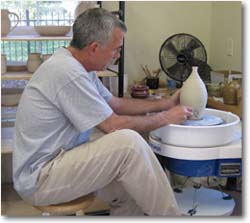
|
| Young trims a piece of porcelain in the workshop behind his home. He credits up to 20 hours a week working on pottery with keeping him sane. Gene's wife shares his hobby, specializing in glazing the pieces he either gives away or donates to Habitat for Humanity, a favorite charity. |
GENE YOUNG: The decision to take the position was made over the course of months. Having worked with Rich over the past few years I knew how much time he spent doing the business of the USCA - something I think probably few USCA members realize about the job. So prior to taking the job, I secured “guarantees” from a number of people I trust and could count on for their input and help. Had they not been willing to work with me I would have declined. We have a very good executive committee, but it takes more than just those district and regional representatives to get the job done.
BOB: So where do you get those other volunteers?
GENE: One of my theories is, "If you want something done, ask someone who's busy.” Busy people have a way or organizing their time most efficiently. I am very time/task/schedule oriented myself, partially due to my job and just my character. I'm usually up at four or five in the morning to get the day started with reading and responding to emails. During the day (between patients) I'm on the computer and phone conducting USCA business. I try to keep my communications brief and to the point. The best way to catch up with me during the day is email.
BOB: Yes, brief and to the point, and they come back to me almost instantly! Your theory must be correct because I've been amazed and impressed that Rich always found time for me no matter how busy, even if he had to call back at night, and I know that as a trial lawyer, your schedule gets pretty hectic, Rich. So have you totally relaxed, now that the pressure is off from the USCA Management Committee and the office staff and the members?
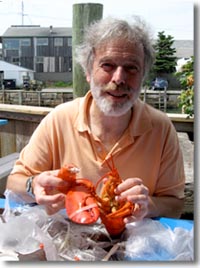
|
| "It's an annual in Maine for us," Curtis says. "I devour a lobster at a local lobster pound and Jennifer - a non-lobster-eater - takes the photo." |
BOB: You did a hugely important "volunteer" job before you agreed to be president - reinventing the Grand Prix and integrating it with the handicap system. I know what a big job it was because I was the middleman in getting it online on the USCA website. What can you do as a post-presidential volunteer to equal that?
RICH: I don't know that I intend to take on something of the same scope as the Grand Prix. Right now, I've volunteered to work on doing a new membership survey to update the demographics of our members to assist us with potential sponsors and to learn how the USCA might better serve its members.
BOB: I couldn't be in the USCA Planning Meeting in March, where all this was discussed, because I was facilitating the USCA Club Organizers Workshop at the same time. But it's pretty clear that "serving the members" means doing SOMETHING for the members where they actually live and play, in their local clubs. A couple of years ago the planning theme was "All croquet is local." Is that still a main theme? How do you see it playing out in the near future, Gene?
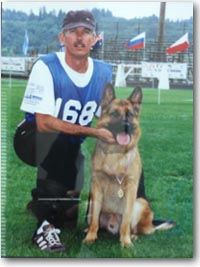
|
| Young's favorite dog, Gino, a German Sheppard, is long deceased. Here's the pair at a competition in Seattle. |
Something new this year is adopting a policy similar to Canada's which allows start-up clubs to rent equipment with the option to buy, which helps a club get started without needing a capital investment up front.
BOB: Okay, you've given me an opening to vote YES on this item, because we've already done that with one of the USCA's newest clubs: The Rutherford B. Hayes Croquet Club in Fremont, Ohio, at the Hayes Presidential Center. I don't think they would have become a USCA club without good equipment to start out, and their eight initial members weren't comfortable committing up front to a big purchase, so when I asked Don Oakley to sponsor a "deal," he obligingly adapted Croquet Canada's policy on the spot, in the service of the USCA. Mike Orgill and I have been talking with the Hayes people for some time - partly because the library there has a huge croquet collection - and it may have been that rent-to-buy equipment offer that tipped the balance. If people working on organizing a new club know that a USCA rent-to-buy policy exists, I think we'd have more new USCA clubs.
GENE: I also need to mention the $30,000 we raised during the 30th anniversary year of the USCA for the expansion of junior croquet and instruction provided by USCA approved instructors. We wanted to provide monies (subject to guidelines) to supplement the cost of getting professional instruction to startup clubs. The guidelines are currently under review and we'll publish them soon. I hope more clubs will take advantage of this program.
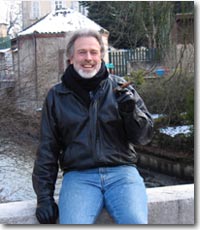
|
| According to Curtis, "I was enjoying a cigar on the wall of a bridge in Bourg-en-Bresse, France, home to the best chickens in the world." |
RICH: We need to be supportive of local clubs (hence the theme "All Croquet is Local") and assist in providing them with models for successful club building such as your work, Bob, with the San Francisco Croquet Club as set forth in your monograph series and the fabulous success that Jackie and Fred Jones have had with the Sarasota Club. If people feel part of the local croquet club, they're more likely to remain involved in croquet and part of the USCA.
However, I'm not sure that I totally accept your thesis as to why members don't renew. Obviously some people realize after the initial interest that they really don't like croquet. Others enjoy croquet but since they don't play in tournaments, they decide that USCA membership isn't important to them and not worth the price. We need to educate people that there are many benefits of membership besides a handicap and participation in the Grand Prix. Without the USCA there would be no standardized set of rules to play by. The Croquet News is a beautifully produced magazine that provides a national overview of croquet. Our website contains a wealth of information and links to the world of croquet. There are many other benefits, not to mention the value of simply being part of the croquet community in America.
BOB:You don't accept my thesis about fun? I'm going to have to appeal to Gene, then, but let me improve my argument as follows: If the promise of FUN is there (and it's okay to include "serious" fun in that concept, or to broaden it by calling it "satisfaction") they'll join, and it's the proper responsibility of the local club and members to try to fulfill that promise somehow - locally, as we agree. The satisfaction will come as a function of competing successfully in the game or partnering with interesting people and making social contacts, and in the fun of both organized and ad hoc activity in the club. The USCA will have made this possible by providing the superstructure to the local club. Did I leave anything out? Gene, will you accept my thesis?
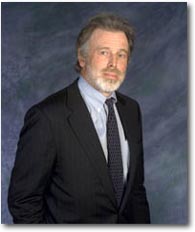
|
| Rich Curtis in "professional" garb. |
BOB: So how do you do that?
GENE: As a result of the planning meeting I'm asking the Regional Vice Presidents to try to visit more clubs in their district, to put a face on the USCA for the local members. One of my personal goals for the year is to visit more clubs, especially the larger clubs as well as the newer ones. The clubs I visited as the Southeast Regional VP always proved to be beneficial for both me and I think them as well. The conversations and input were always a good exchange. I was able to listen to their expectations and provide explanations if possible.
BOB: I can tell you, Gene, this makes a huge difference. Way out in San Francisco in the late eighties, when we felt very removed and separate and alienated from Palm Beach croquet, playing on our public courts - which were still a rarity then - it made a huge difference to see Foxy Carter playing in our Open, along with the USCA Executive Director, Anne Frost-Robinson, and then Bill Berne, and then Dan Mahoney. They all came, in their turn, and the message our members got was that the USCA really did appreciate our achievement in building a hugely successful club on public turf - the precursor to the great public club development model that Fred and Jackie Jones have created with the Sarasota Croquet Club on the Florida West Coast.
But I'm going to persist in believing that if you put the emphasis on FUN when you introduce novices to the club, to the game, to the facility, that's where you'll get the biggest payoff in membership retention. The croquet fanatics determined from Day One to become world champions cannot possibly be dissuaded anyway. They're in for good, you don't have to worry about them. But Gene, you hit it when you said, "the non tournament players are a more difficult group to reach with the USCA story." Most USCA events are tournaments - that's the way the USCA is organized. And only one-third of USCA members play in tournaments - that's a concrete figure, amounting to the number of people in the annual USCA Grand Prix. That leaves two-thirds who NEVER play a USCA tournament, not even one a year, not even a multi-flight club championship.
The question is, what to do for them? There are croquet schools - but those are just as intense as tournaments, in the same time-scale. I produced a couple of International Croquet Festivals at the National Croquet Center, organized around the choice of a lot of different activities, most of them low-key. Terry Colbert's "Croquet Circus" at the NCC was a worthy experiment. When I was organizing the National Croquet Center, I promoted to USCA members some travel excursions to Palm Beach County that included croquet and a lot more. (The Palm Beach Croquet Trail.) What else is possible?
GENE: Good question! I've posed that question to a number of the management committee and it's a continuing discussion. Like you, a number of years ago we had a croquet festival in Etowah, North Carolina, which is my croquet club. It was well attended and people had a blast. We played any number of formats, low key and leisurely. The outcomes had no impact on handicaps or anything else. You're a man of ideas…..what else would you suggest for “fun?"
BOB: Maybe the questionnaire Rich is working on can pose the question specifically to high-handicap or novice players, like "What kind of multi-day USCA event would you like to attend?" And then give a number of alternatives, like "A travel package that includes hosted visits to several croquet clubs in one area over the course of a week, with many choices ranging from casual play to one-day competitions in Golf Croquet." Or "A five-day USCA Croquet Festival at the National Croquet Center in November that incorporates a multitude of choices, ranging from casual croquet to one-day tournaments, skill contests, instruction and coaching and unusual, fun games." Like that.
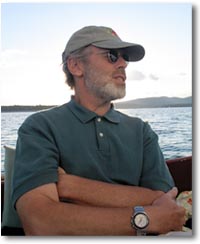
|
| Curtis off the coast: "Maine is supposedly a non-croquet vacation spot each year for us, but most of our friends are, of course, croquet players." |
BOB: So Rich, even though you won't accept my "fun" thesis, I'm sure you wouldn't object to finding out what aspects of USCA croquet the high-handicap players most enjoy, and how the USCA can provide more of whatever that is - provided, of course, that the USCA can afford it, in these tough economic times.
RICH: Of course. Along with improving communications between the USCA and members, we want to make playing croquet more fun for everyone, but particularly high-handicap players. That will be part of the survey.
BOB: It seems to me that the national headquarters facility in West Palm Beach would be an obvious choice for looking at as the place to organize high-handicap, fun events around. Which leads me to an important question: With the continual changes in personnel and management philosophy at the Center, how do you see the relationship between the Center and the USCA evolving?
RICH: The relationship between the USCA and NCC has been mostly positive. There have there been some bumps in the road…yes, but any issues have been resolved in a mutually satisfactory way. I see no reason this good relationship can't can’t be maintained and expanded. At present we're exploring a way to cut expenses when tournaments are held at the National Croquet Center and the Center is working with us and making suggestions. We'll know more as the year progresses and as new management takes hold.
BOB: I hope the Global Economic Crisis doesn't make it more difficult. I've noticed and have been personally affected by destructive competiti on among the croquet entities over the years, and especially after the Steuber stroke when Center management and financing became the paramount issues for the owner, the Croquet Foundation of America. Which reminds me: In response to the shrinking economy, instead of expanding services, almost all organizations are trying to figure out how to keep their heads above water financially, and I know the USCA didn't quite cover expenses last year. Is there any kind of austerity plan or fundraising plan in the works to cover costs?
GENE: The budget process for the USCA this year was difficult. Jim Armour, the USCA treasurer, worked hard to trim the budget. Expenses were trimmed approximately 20% this year in order to offset projected loss in revenues. As you are aware, the USCA only has three main mechanisms for raising money…dues, sanction fees, instructional schools. Beyond that, some fund raising is done at some title events in the form of silent auctions. In these economic times we chose not to raise dues on the membership, and that's a good thing. I'm also happy to tell you that our first quarter report show us to be ahead in the budget. Does that mean we'll be ahead for the entire year? No. But we'll continue to monitor very closely and alter course as needed. Currently I don’t foresee any major or organized fundraising events needed in 2009.
BOB: How will the trimming of expenses affect members? Will it mean cutting back on postal mail-outs or print-on-paper publications or anything else the ordinary member would see coming from the USCA, or changing the balance between mail-outs and printed publications versus email and website communications?
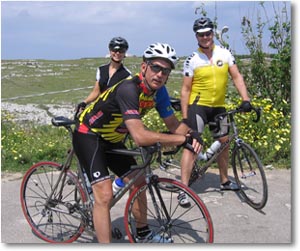
|
| This recent snap shows Gene cycling with friends in Italy. |
BOB: But that doesn't necessarily mean members will have access to less information. Jeff Soo and Leo Nikora are constantly expanding the website capability, and the USCA office has started sending out monthly newsletters to members by email, so all of that means to me that despite some cost cutbacks, there can actually be MORE communication - it just means more of it will be arriving by email and less by postal mail. Right?
I'm going to assume that's right and now ask my favorite interview question, which is: What question would you like to answer that I haven't yet asked?
GENE: I'm good to go, Bob. Thanks for doing the interview. I think this is a good way to get some information out to the USCA members.
RICH: I agree it's been worthwhile to let the members get a sense of where the USCA is headed. My prediction is that under Gene's leadership the USCA is going to become a more responsive and stronger organization.
|
WHO AND WHERE IS THE REAL GENE YOUNG AND WHAT IS HE DOING AT THE MOMENT? The new USCA president is a very busy dentist, but that's the least of it. As an over-achiever, he spends about 20 hours a week in his pottery studio - which he credits with keeping him sane as "a sure form of relaxation." He sells out every show he does but gives most of the ceramics to his patients or to Habitat for Humanity to sell. His wife Laura is heavily involved in this hobby as a glazer of pots. Gene has always been into Sheppards - the European breed - and has put into his will a provision for burying with him the ashes of his favorite dog Gino (now deceased), who competed successfully in a number of national shows. Gene has earned many distinctions in the world of dentistry and is very active in his North Carolina community as a past president of the local United Way and of the Cleveland County NC Chamber of Commerce. Besides dogs and ceramics, he has done competitive swimming, put in 5000 flying hours with Multi Engine Commercial rating, raced sailboats long and hard. and has behind him ten years of classical training in piano. And there's also his stint as a drummer in a rock band to help pay his way through college. Gene has taken up his new duties as USCA president with all the energy and enthusiasm of a hungry young canine with a new bone.
|
|
RICH CURTIS: MORE TIME FOR LAWYERING AND PLAYING CROQUET With a J.D from State University of New York at Buffalo Law School in 1979, Rich Curtis joined the New York State Bar in 1980 and commenced building an impressive resume as a litigator in the state and US district courts and at the appellate level. In his law practice at Rochester's Kaman, Berlove, Marafioti, Jacobstein & Goldman, which he joined as a partner in 2006, Rich concentrates his practice on matrimonial law, commercial litigation and general civic litigation. He has tried cases throughout the State of New York in both state and federal court. The famous Curtis cool - which deserts him only occasionally on the croquet court and never in the courtroom - got him through four years as a highly regarded USCA president, turned over in March 2009 to his friend Gene Young. |